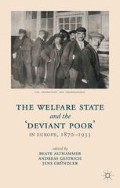Abstract
By the time James Russell Motion, head of the local Poor Law admin- istration in Glasgow,2 was offering his opinion on the ‘feeble-minded’ and the ‘morally degenerate’ before the Royal Commission on the Care and Control of the Feeble-Minded in 1906, discourses on degeneracy and eugenics were already influencing science, politics and public opin- ion on a global scale.3 The Royal Commission, warranted in 1904, was to consider the ‘existing methods of dealing with idiots and epileptics, and with imbecile, feeble-minded or defective persons not certified under the Lunacy Laws; and in view of the hardship or danger result- ing to such persons and the community from insufficient provision for their care, training and control, to report as to the amendments in the law or other measures which should be adopted in the matter’.4 It was in session from 1904 and published the results of its investigation in 1908 as the Radnor Report. This appeared in combination with several volumes of evidence compiling written statements and interviews from medical and Poor Law experts. The Commission was the result of a eugenic discourse that had gathered momentum in the years before the turn of the century. In Britain around 1900, as Mark Jackson has stated, ‘the combined experiences of teachers, workhouse officials, prison medical officers, and asylum superintendents had convinced a number of professional groups that children who were unable to benefit from ordinary elementary education and adults who were unable to provide for themselves constituted a menace to social stability and a threat to the strength of the nation’.5 Motion’s statements were, therefore, by no means exceptional; his views were widely accepted. They referred to those living on the margins of society, pursuing lifestyles that were ‘deviant’ according to bourgeois norms, and who were seen as a burden on the ratepayers.
‘The Ins and Outs’ referred to are those who, while drunk practically every week, are never and have never been in a police court. They are a feeble-minded and most degraded part of the population. ... Their confinement [i.e. men and women, suffering from venereal and other morally charged diseases] would prevent the risk of breeding the class of feeble-minded and imbecile children we have already to deal with.1
Access this chapter
Tax calculation will be finalised at checkout
Purchases are for personal use only
Preview
Unable to display preview. Download preview PDF.
Notes
M. Jackson (2004) ‘“A Menace to the Good ol Society”. Class, Fertility and the Feeble-Minded in Edwardian England’, in J. Andrews and A. Digby (eds.) Sex and Seclusion, Class and Custody. Perspectives on Gender and Class in the History of British and Irish Psychiatry (Amsterdam/New York: Rodopi), pp. 271–294
For an overview see, for instance, D.J. Kevles (1995) In the Name of Eugenics. Genetics and the Uses of Human Heredity (Cambridge, MA/London: Harvard University Press)
A. Bashford and P. Levine (2010) The Oxford Handbook of the History of Eugenics (Oxford: Oxford University Press)
R.C. Engs (2005) The Eugenics Movement. An Encyclopedia (Oxford: Greenwood).
R.L. Dugdale (1877) Fhe Jukes. A Study in Crime, Pauperism, Disease and Heredity (New York: Putnam).
R Galton (1905) ‘Eugenics. Its Definition, Scope and Aims’, in R Galton, E. Durkheim and P. Westermarck, Sociological Papers 1 (London: Macmillan), pp. 45–79
J. Sibbald (1895) ‘Memorandum for the General Board of Lunacy for Scotland, On the Increase in the Number of the Insane on the Register of the General Board of Lunacy for Scotland, with special reference to the Allegation that it indicates an Increased Prevalence of Insanity’, Supplement to the Fhirty-Sixth Annual Report of the General Board of Commissioners in Lunacy for Scotland: Alleged Increasing Prevalence of Insanity in Scotland (Edinburgh: HMSO), p. 55.
Author information
Authors and Affiliations
Editor information
Editors and Affiliations
Copyright information
© 2014 Jens Gründler
About this chapter
Cite this chapter
Gründler, J. (2014). ‘Degeneracy’ and ‘Moral Imbecility’: Local Implementation of Medical Discourses on Deviancy in Scottish Poor Relief Administration. In: Althammer, B., Gestrich, A., Gründler, J. (eds) The Welfare State and the ‘Deviant Poor’ in Europe, 1870–1933. Palgrave Macmillan, London. https://doi.org/10.1057/9781137333629_9
Download citation
DOI: https://doi.org/10.1057/9781137333629_9
Publisher Name: Palgrave Macmillan, London
Print ISBN: 978-1-349-46229-2
Online ISBN: 978-1-137-33362-9
eBook Packages: Palgrave History CollectionHistory (R0)

